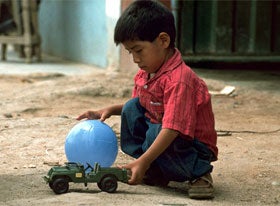Although polio was eradicated from the region, virus samples stored in some countries may present circulation risks. A comission of experts established by the Pan American Health Organization is requesting that the countries take actions to protect against these risks.
Buenos Aires, 5 March 2010 (PAHO) - In 1994 the countries of the Americas achieved through vaccination to eradicate polio in the region and prevented thousands of deaths or paralysis caused by the disease, especially in children. However, the virus still exists in laboratories and its storage may endanger the final eradication of this disease.

Luis Fermín Tenorio Cortez, the last case of polio in the Americas (Armando Waak-PAHO/WHO)
The Pan American Health Organization (PAHO) established in 2004 the Regional Commission on Polio Containment to verify that the wild polio virus in laboratories is suitably contained. National committees were established and surveyed 59,904 laboratories in 42 countries.
The study results were presented to PAHO's Director Dr. Mirta Roses on the 5th meeting of the Committee, held on 4 and 5 March in Buenos Aires. According to the report, only nine countries (Argentina, Brazil, Canada, Trinidad and Tobago, Chile, Costa Rica, Guatemala, Mexico and USA) reported having wild virus or infectious material stored in 246 laboratories. Three countries (Colombia, Cuba and Panama), are now among the 33 that do not have the virus, because they destroyed it.
"The wild polio virus has not circulated in the Americas for 19 years, but we must remain vigilant. The virus exists in laboratories and can escape in the absence of adequate security conditions," noted Dr. Carlyle Guerra de Macedo, President of the Regional Commission on Polio Containment. Globally, the polio virus still circulates in Africa (Nigeria) and Asia (India, Pakistan and Afghanistan).
Dr. Macedo explained that the vast majority of laboratories surveyed present adequate security conditions, although "there is always a risk that the virus can escape through the people who handle it. If that happens it could affect a small number of people who do not develop immunity through vaccination, so the wild virus should always be kept in conditions of absolute safety," he said.
The former Director of the Pan American Health Organization cited as an example to follow the eradication of another disease, smallpox. Since it was eliminated, 30 years ago, viruses exist only in some four laboratories around the world, "in absolute security."
According to Dr. Guerra de Macedo, polio is a disease of poverty. The disease is spread through oral-fecal transmission, when a person carrying the virus (sick or not) excretes the virus into the environment and a healthy person ingests it through contaminated water or vegetables.
The Regional Commission on Polio Containment includes doctors Elsa Moreno from Argentina, Walter Dowdle, from the United States, Alexander Existe, from Haiti; Querales Jesus Castillo, from Venezuela, and Claudette Harry, from Guyana. It seeks to collaborate with countries to destroy the virus in laboratories, transfer it to safer institutions and leave the minimum necessary for research, which implies defining of national policies and maintaining strict vigilance.



